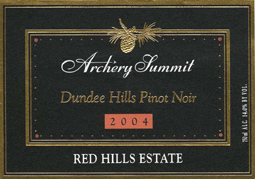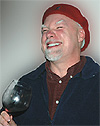

Archery Summit
2004 Pinot Noir, Red Hills Estate(Dundee Hills)
My tasting history with Archery Summit goes back to the 1996 vintage, and I will confess that in many subsequent years their wines have been among my favorites. But not in all years. The warmth of the 2003 vintage seemed to accentuate too much the bold Archery Summit style, and I found their wines overblown. 2004 however, seems an ideal Archery Summit vintage — and my ideal Archery Summit wine has almost always been the Red Hills Estate.
This Dundee Hills appellation vineyard includes a wide variety of Pinot Noir clones, from the foundational Pommard and Wädensweil clones, to the expected Dijon clones (113, 114, 115, 667, 777), to a series of “Archery Summit” clones (sometimes claimed to be “suitcase clones” from a few famous Burgundy estates).
The nose of this wine shows deep red and black fruitiness — plum, cherry, raspberry — with a hint of tea leaf, roasted meat, and touches of cinnamon spice and vanilla well in the background. On the tongue red cherry and raspberry notes predominate, with complexing elements of bittersweet chocolate, rose petals, cola, and bacon fat. Well balanced, the acidity gives an uplift to the fruit, while very fine grained and well integrated tannins supply good structure. The finish is gentle, long, and flavorful.
I find the Red Hills Estate to be more red-fruited and less spice-driven than the Arcus, yet it has a certain communality of characteristics: the fruit is sweet without being cloying, the acidity is bright without being forward, and the spice provided by 13 months in barrel is present, but not obvious. All in all, this is a great example of what Dundee Hills fruit tastes like in a well balanced vintage.
Reviewed August 3, 2007 by Cole Danehower.
Other reviewed wines from Archery Summit
The Wine
Winery: Archery Summit |
The Reviewer Cole Danehower
Cole Danehower
Cole Danehower is the creator of the Oregon Wine Report. A frequent judge and a member of Northwest Palate magazine’s review panel, Cole's palate is particularly attuned to Northwest wines. He believes numerical scoring is inadequate in conveying the character of a wine, preferring to communicate his experience and evaluation of a wine through words. A believer in terroir (especially in Oregon's cooler growing regions) he also pays attention to the impact of winemaking style and vintage variation on a wine. He views balance, flavor purity, and a sense of character as key vinous virtues. |














